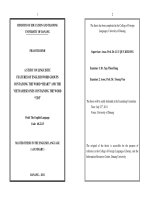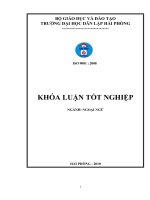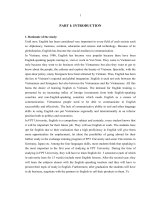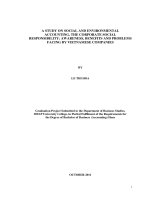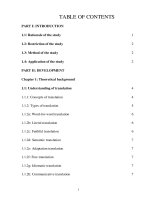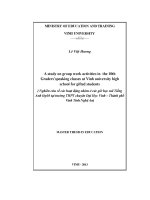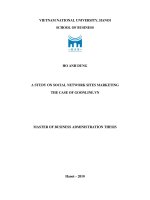a study on social and environmental accounting, the corporate social responsibility awareness, benefits and problems facing by vietnamese companies
Bạn đang xem bản rút gọn của tài liệu. Xem và tải ngay bản đầy đủ của tài liệu tại đây (750 KB, 68 trang )
i
A STUDY ON SOCIAL AND ENVIRONMENTAL
ACCOUNTING, THE CORPORATE SOCIAL
RESPONSIBILITY: AWARENESS, BENEFITS AND PROBLEMS
FACING BY VIETNAMESE COMPANIES
BY
LE THI HOA
Graduation Project Submitted to the Department of Business Studies,
HELP University College, in Partial Fulfilment of the Requirements for
the Degree of Bachelor of Business (Accounting) Hons
OCTOBER 2011
ii
DECLARATION OF ORIGINALITY AND WORD COUNT
I declare that this graduation project is based on my original work except for
quotations and citation which have been duly acknowledged. I also declare that it has
not been previously or concurrently submitted for any other courses/degrees at HELP
University College or other institutions. The word count is 9857 words.
LE THI HOA.
17 October, 2011
iii
ACKNOWLEDGEMENT
I would like to express my gratitude to all those who gave me the possibility to
complete this thesis. I would like to give my thankfulness to Ms. Sumathi and Ms.
Shenba at Help University College, who initiated the project and give me instruction
and support.
My heartiest thanks to lecturers and my colleagues in Vietnam National University,
International School for helping me broaden my view and knowledge.
I am deeply indebted to my supervisor, Dr. Pham Duc Hieu from Viet Nam
Commercial University whose always help, stimulate suggestions and encourage me
in all the time of research for and writing of this thesis.
My grateful thanks also go to both enterprise Agribank and Baoviet Group, their
managers, employees and customers and other people who spend time to answer my
questionnaire in helping me complete this thesis.
Last but not least I would like to thank my friends especially those who stand side by
side help me from the beginning until completing this thesis.
iv
A STUDY ON SOCIAL AND ENVIRONMENTAL ACCOUNTING, THE
CORPORATE SOCIAL RESPONSIBILITY: AWARENESS, BENEFITS AND
PROBLEMS FACING BY VIETNAMESE COMPANIES
BY
LE THI HOA
OCTOBER 2011
Supervisor: Dr. PHAM DUC HIEU.
ABSTRACT
The social and environmental issues and the impact of them on the decision making
process have been increasingly given attention to the financial reporting. Over time
there are many studies about Social and Environmental Accounting that have
different views and arguments on the importance to the corporate report. In
developed countries, the social and environmental accounting has joined the financial
report and annual report; however it is still a new concept to Vietnamese enterprises.
The objective of this study is to assess the understanding of Vietnamese people on
the social and environmental concept, their implementation on companies in Hanoi.
In order to collect data for the research, questionnaire survey will be used as a
helpful method. The finding uncovers that although most people understand the
importance of social and environmental activities and having corporate social
responsibility reports, few of Vietnamese companies is able to quantify the cost and
benefits of social and environmental activities as in the financial report.
v
TABLE OF CONTENTS
DECLARATION OF ORIGINALITY AND WORD COUNT ii
ACKNOWLEDGEMENT iii
ABSTRACT iv
TABLE OF CONTENTS v
LIST OF FIGURES AND TABLES viii
LIST OF ABBREVIATION ix
1 CHAPTER 1: INTRODUCTION 1
1.1 Research Background 2
1.2 CSR in Vietnam 4
1.3 Problem Statement 7
1.4 Objectives and Scope of Research 10
1.5 Research question 10
1.6 Structure of Research 10
2 CHAPTER 2: LITERATURE REVIEW 12
2.1 Accounting theory 13
2.1.1 Definitions and objectives of accounting 13
2.1.2 Stakeholder theory 16
2.2 Corporate Social Responsibility 17
2.2.1 Definition of CSR 17
2.2.2 The triple bottom line 18
vi
2.2.3 The importance of CSR on business activities 19
2.3 Social and Environmental Accounting 21
2.3.1 Definitions of Social and Environmental Accounting 21
2.3.2 Social and Environmental Accounting Report 23
3 CHAPTER 3: RESEARCH METHOD 28
3.1 Research Objectives 29
3.2 Research methodology 29
3.3 Data sources 31
3.3.1 Primary data 31
3.3.2 Secondary data 31
3.4 Sampling 32
3.5 Research instrument 32
3.6 Limitation of the research 33
4 CHAPTER 4: RESULT AND DATA ANALYSIS 34
4.1 Introduction of Agribank and BaoViet Group 35
4.1.1 Introduction of Agribank 35
4.1.2 Introduction of BaoViet Group. 36
4.2 Description of Respondents‟ information 38
4.2.1 Description of respondents‟ age 38
4.2.2 Description of respondents‟ gender 39
4.3 Description and Analysis of respondents about the Awareness of Social and
Environmental Accounting 40
vii
4.4 Description and Analysis of respondents about the Implementation of Social
and Environmental Accounting: 43
5 CHAPTER 5: CONCLUSION 49
5.1 Conclusion 50
5.2 Recommendation 51
5.3 Limitation of study 53
5.4 Suggestion for future research 53
6 REFERENCES 55
7 APPENDIX 58
viii
LIST OF FIGURES AND TABLES
Figure 2.1: The theoretical framework of the research 15
Figure 2.2: The triple bottom line (Source: Susan Patel, Triple bottom line and Eco-
Efficiency: Where to Start?) 18
Figure 4.1: Age frequency of respondents 38
Figure 4.2: Gender frequency of respondents 39
Figure 4.3: Understanding the meaning of “Social and Environmental Accounting”40
Figure 4.4: Description of Result – Question 2 – Part II 41
Figure 4.5: Description of Result – Question 3 – Part II 42
Figure 4.6: Description of Result – Question 1 – Part III 43
Figure 4.7: Description of Result – Question 2 – Part III 45
Figure 4.8: Description of Result – Question 3 – Part III 46
Figure 4.9: Description of Result – Question 4 – Part III 47
Table 3.1: Quantitative, Mixed, and Qualitative Methods (Source: Creswell, 2009, p.
15) 30
Table 4.1: General information of Agribank 36
Table 4.2: General information of Baoviet Group 38
ix
LIST OF ABBREVIATION
CSR
:
Corporate Social Responsibility
SEA
:
Social and Environmental Accounting
TBL
:
Triple bottom line
1
1 CHAPTER 1: INTRODUCTION
This chapter introduces the rationale of the research, which includes the aims,
objectives and scope of the study. The method used for collecting data and structure
of the research are also mentioned in this chapter. Overall, this chapter consists of six
parts as follows:
1.1. Research Background
1.2. CSR in Vietnam
1.3. Problem Statement
1.4. Objectives and Scope of the Research
1.5. Research Questions
1.6. Structure of the Research
2
1.1 Research Background
Environmental pollution and social equity are not only the issues of each country, but
the general issues of the worldwide. In current period, countries which want to
implement the sustainable development objectives must also implement the
environmental protection and social welfare programs. Environmental and social
protection is the urgent task of each enterprise, each level, each sector, and each
country. For any economic sector, the development is always linked to the
sustainability of environment and society. In the long term, the responsibilities of the
enterprises to the environmental and social issues shall be an important factor to
increase the profit of these enterprises. Thus, the enterprises are required to balance
between the economic benefits and social and environmental contributions,
implementing the responsibilities of the enterprises to the environment through
particular actions such as: environmental impact assessment, paying environmental
tax, classifying and treating solid waste, minimizing the costs on materials, fuel and
reducing the costs for waste. Especially in the background of international economic
integration and globalisation, the competition is fierce and fiercer, many enterprises
only concern on their short-term benefits and have decisions and actions with
negative impacts on the environment; as a result, they have to pay the penalty for
their actions when the consumers and the society boycott their products. This fact
forces the enterprises to consider the environmental and social accounting in the
accounting tasks of the enterprises.
3
CSR links the responsibilities of the enterprises with the society and links the
activities of the enterprises to the strict environmental and social standards, and
support the community in different manners. Accordingly, besides the criteria on
using advanced, clean, environmentally friendly technologies, reducing carbon gas
and toxic substances which may cause bad impacts on the ozone layer, and climate
change, enterprises are also required to be transparent in their production and
business activities and the leaders of the enterprises should be responsible for
explanations to relevant competent authorities. To implement CSR, first of all, it is
required to have high agreement within the enterprise, the conformity to the
regulations of the state and local regulations of the enterprises on enterprise
administration, local rules on control and audit activities and business ethnic.
Thus, CSR is not the thing that the enterprise can have immediately. This requires a
long run for both constructing and learning experience from mistakes in the past to
direct to the sustainable future. Then, besides financial statements, report on business
results, report on social responsibilities implementation of the enterprises, Corporate
Responsibility Report and Sustainability Development Report are the indispensable
documents in the annual report. For enterprises posted on the security exchange, this
requirement is more demanding. Then the value of trademark of the enterprises
depends much on the contents of such report.
Profit is the purpose of business, but social responsibility execution is the foundation
for sustainable development of not only each enterprises but the whole country.
Companies with responsibilities for the society normally create breaking
achievements in business and gain the honourable criteria in profit and market while
4
do not destroy the environment and consume much natural resources. Investment and
development for business and production with social responsibility is the most proper
selection which normally brings about high economic effectiveness in long run
because the consumers always select products and services from the enterprises with
respects to the natural resources, environment and society.
1.2 CSR in Vietnam
Executing the social responsibility is a job which cannot be ignored in the integration
route of Vietnamese enterprises because this job will bring about the benefits for
both enterprises and the social benefits, especially to increase the competitiveness of
the enterprises and country and support better the implementation of labour law in
Vietnam. For Vietnamese enterprises, this job is merely at starting phase, but is a
long-term job. Thus, right at this period, we should have directive actions and create
conditions for the enterprises to fulfil their social responsibility.
With the developing economy in Vietnam, most enterprises are small and medium-
sized enterprises so the application and execution of social responsibility have not
yet paid due attention. However, some enterprises have already applied CSR in their
business strategies. Typically, such social programs as “6 million glasses of milk for
Vietnamese children”, the study encouragement fund of “fire-fly lamp” by famous
trademarks such as Vinamilk, Dutch Lady have concerned and supported by the
consumers. Or HUB Café, a medium and small-sized enterprise is also implementing
CRS by creating a community library with more than 100,000 books serving for
customers. HUB Café is being constructed to become a place for sharing knowledge
5
and documents which is very useful for students and the research community to
organize exchanges and conferences on issues relating to study, working experience
and career.
However, in Vietnam, it should be admitted that after what happened to Vedan, Tung
Kuang, Vinamit we should remind about the construction and execution of social
responsibility of the enterprises. Because, only after the cases became on public, the
management agencies tried to find out the solutions while the consumers and the
society had to suffer from consequences. With information about the impacts on the
environment, ecology and social life of most of people, the view about dividend
distributed from the profit that the enterprises gain from avoiding wastewater
treatment should be reviewed, this will have direct ratio to the ratio of consumers
who refuse to use the products and services provided by these enterprises. This fact is
unavoidable. The Vietnamese enterprise community has not yet paid attention to the
implementation of CSR with typical examples such as: wastewater treatment, failing
to conform to the obligations of the enterprises to the state budget, commercial fraud,
production of counterfeit goods, and circulation of goods with poor quality. Another
example is that the enterprises waste, lose or use ineffectively the investment capital
from state budget which is actually the tax payments from the people and enterprises.
Regarding to the environmental pollution in Vietnam, in order to complete in the
global economy, the enterprises are required to ensure that their operations will not
cause any negative impacts on the ecological environment; it means that their
production procedures must be environmentally friendly. This is an important
criterion for the consumers because the fact of environmental pollution caused by the
enterprises has become an urgent and hot issue of the society such as the case of
6
Vedan Vietnam Company which discharged the untreated wastewater to Thi Vai
River as well as other actions causing environmental pollution of many other
companies. Thus, for the case of Vedan, their business activities are lack of ethnic
and responsibility to the environment, labour and the whole society which are
nursing the company.
According to Ms. Nguyen Hong Ha, Deputy Director of Vietnam Chamber of
Commerce and Industry (VCCI) in Ho Chi Minh City, CSR should be placed in the
business strategy of each enterprise. This has been a decisive and necessary part of
the success of the enterprises. Examples about CSR above show that CSR is not only
a voluntary job but the enterprises should invest to make this become an activity of
mutual benefits. Ms Ha explained “An enterprise has created a more stable business
environment and higher productivity after applying CSR”. Furthermore, they also
receive the support from the consumers and society for the general benefits of the
enterprises for the community.
In the background of Vietnam joining WTO, besides removing fences relating to tax,
the laws on environment, labour safety are also issued and amended which require
the enterprises to strictly and sufficiently conform to these regulations, then “it is the
most suitable time for enterprises to implement CSR” added Ms. Ha.
To be successful in applying CSR in Vietnam, firstly, the enterprises should
implement CSR on their own labour such as conforming to laws on salary, social
insurance, labour contract to construct the relation basing on the trust and goodwill
between the labour and the enterprise. Ms. Ha also judged that the biggest difficulty
7
of the Vietnamese enterprises at the present is information which leads to the
situation that the enterprises do not know where to start jobs relating to CSR. To
promote the implementation of social responsibility of the enterprises, the best
solution is to establish an association or organization in charge of monitoring and
consulting the enterprises. The state should issue policies supporting for enterprises
to implement CSR.
1.3 Problem Statement
Recently the public is watching closely to pressing cases of violating business ethics
and destroying the environment and health at serious level such as milk with
melamine in China or discharging untreated wastewater directly to Thi Vai River by
Vedan Company in Vietnam. The wrong-or right of the above cases are clear.
However, for the society and thousands of operating enterprises, the issue of
Cooperate Social Responsibility (CSR) is set up and requires to be discussed
seriously in terms of policy argument and practice.
What should a company do to be evaluated by the society as a good company with
sustainable development? What are the responsibilities of the state management
agencies? Which level should the law regulate about the corporate social
responsibility? Whether or not the consumers in developing countries have fewer
rights and or they are vulnerable or they are not provided with sufficient rights and
means or fail to use sufficiently the rights and means given to them to protect their
legitimate benefits? Instead of some enterprises which have applied CSR policy and
ethnic rules, we normally base on top-down approach while the suppliers apply the
8
ethnic rules when they are required from the customers other than they develop CSR
themselves to expand their market share. This may require the enterprises to apply
many different ethnic rules, depending on the number of customers that they are
having transactions, sometimes this is a contradiction. Furthermore, the
understanding of the term of CSR in Vietnam has considerable changes at national
scope and at the enterprises. This will made the application of CSR in Vietnam is
more passive.
The issue is that how we can rely on the voluntary investment of the enterprises
when there is lack of legal framework, regulations and necessary monitoring of the
society and the community. Lessons show that the power of profit can make the
enterprises blind and irresponsible by hiding their legal actions and the voluntary
investment of the enterprises is very limited. The system of laws has been innovated
and reconstructed deeply from the constitution, laws to decrees however they are not
synchronous. There are many overlapping and contradictory issues between laws
prepared by different ministries, issued at different periods. The implementation of
the laws requires many amendments and the distance between the laws on documents
and the laws on the practice is still large. The knowledge on laws and conformity to
the laws of the small-sized enterprises are still limited, the corporate social
responsibility issue has been highly concerned at the large-scale enterprises but at
small-sized and medium-sized enterprises, households and farmers, the conformity to
labour law, regulations on food sanitation and hygiene is still limited. Meanwhile, in
Vietnam, there is lack of legal framework and instructions for the enterprises to
prepare the report on social accounting, social auditing and social reports to inform
the community for monitoring. Because in the annual reports, financial statements,
9
there is no CSR or a very simple and general CSR report and there is no item about
the social and environmental accounting in figures on how damages or profits are
changed on CSR in profit of each enterprise.
In effect, Vietnamese companies are doing business in a period that the country is
joining to the global economy. Vietnam has been participating into many
international organisations such as WTO, ASEAN, etc. This circumstance causes
radical changes of the business‟s perception of most companies that they have to
consider both internal and external environments. Therefore, the concept of
traditional accounting, which the accountants deal with only the issues that take place
within the organisation itself or between it and its suppliers or customers, has to
change to the modern view, in which they have to adapt to a new social climate of
community accountability to all stakeholders.
Vietnam nowadays has been facing with financial difficulties such as the high rate of
inflation. Many companies are striving to reduce their expenses by actions to infringe
legal rights of employees and pollute the environment. They are not aware of the
consequence to the whole economy and the negative impacts to their business‟s
performance in the long term. Some companies consider the implementation of
social contribution and environmental preservation as a part of their advertisement
strategy or charity activities. Consequently, their business reports mainly focus on
the financial issues and the cost of CSR activities is taken from their profits rather
than considered as an initial expense.
10
1.4 Objectives and Scope of Research
Objectives of Research:
- To investigate the understanding of people about CSR and Environmental and
Social Accounting in Vietnamese companies;
- To understand the current implementation of CSR and Environmental and Social
Accounting in Vietnamese companies.
Scope of Research:
- Research conducting place: Agribank and Bao Viet Group, Ha Noi, Viet Nam.
- Object of the research: managers, employees and customers.
- Time duration of conducting the research: from July 25, 2011 to October 10, 2011.
1.5 Research question
- What is CSR?
- What is environmental and social accounting?
- Why are they important to the business activities?
- What are Vietnamese companies aware of the importance of social and
environmental issues in their business activities?
- How do they implement CSR and social and environmental accounting in reality?
1.6 Structure of Research
This project is divided into five following chapters:
Chapter I: Introduction
11
Chapter II: Literature Review
Chapter III: Research Method
Chapter IV: Description and Data Analysis
Chapter V: Conclusion and Recommendation
The first chapter introduce the rationale of the research. Chapter two includes the
literature review of Accounting theory, CSR, SEA, and their theories related. Chapter
three introduces the research methodology used to conduct this study. The research
objectives, research method, research instruments, research data will be stated.
Chapter four describes and analyses collected data through primary and secondary
data source. Chapter five gives the conclusion for this study and suggestion for future
research is gave out. Besides, each chapter is divided into sub-sections in order to
make it easier to follow. These sub-sections are listed in the beginning of each
chapter.
12
2 CHAPTER 2: LITERATURE REVIEW
This chapter analyses the information of accounting theory, CSR, social and
environmental accounting, and their application in practice. The concepts and
theories related to these issues will be indicated as the background of the research.
Chapter 2 includes the following parts:
2.1. Accounting theory
2.2. Corporate Social Responsibility
2.3. Social and Environmental Accounting
13
2.1 Accounting theory
2.1.1 Definitions and objectives of accounting
Accounting is a comprehensive discipline and it is difficult to explain satisfactorily
through any single definition. According to The American Accounting Association,
accounting is defined as
1
:
"the process of identifying, measuring and communicating economic
information to permit informed judgments and decision by users of the
information. This definition stresses three aspects which are identifying,
measuring and communicating economic information."
The Committee on Terminology that appointed by the American Institute of Certified
Public Accountants defines accounting is
1
:
"the heart of recording, classifying and summarising in a significant
manner and in terms of money, transactions and events which are, in
part at least, of a financial character and interpreting the results
thereof: This is a popular definition of accounting and it outlines the
nature and scope of accounting activity."
14
In general, the objectives of accounting are as follows
1
:
i) To keep systematic records: Accounting is done to keep a systematic
record of financial transactions, like purchase of goods, sale of goods, cash
receipts and cash payments. Systematic record of various assets and
liabilities of the business is also to be maintained.
ii) To ascertain the net effect of the business operations i.e., profit or loss of
business: We know that the primary objective of business is to make profit
and the businessman is very much interested in knowing the same. A proper
record of income and expenses facilitates the preparation of the profit and
loss account (income statement). The profit and loss account reveals the
profit earned or loss incurred by the business firm during a particular period.
iii) To ascertain the financial position of the business: The businessman is
not only interested in knowing the operating result, but also interested in
knowing the financial position of his business i.e., where it stands. In other
words, he wants to know what the business owes others and what it owns,
and what happened to his capital-whether the capital has increased or
decreased or remained constant. A systematic record of various assets and
liabilities s facilitates the preparation of a statement known as balance sheet
(position statement) which answers these questions.
iv) To provide accounting information to interested parties: Apart from the
owners, there are various other parties who are interested in knowing about
the business firm, such as the management, the bank, the creditors, the tax
authorities, etc. For this purpose, the accounting system has to supply the
required information.
1
15
The theoretical framework of the research is emerged from the scope of accounting,
the accounting as an information system, and the role of accounting theory to reflect
the concept of people about accounting and accountability.
Figure 2.1: The theoretical framework of the research
The scope of accounting is to look for the transformations in the ways in which
accountants assess and report corporate performance. With the development of the
sustainability agenda which embraces not only environmental and economic
dimensions but also social and ethical dimensions or what we call now is „triple
bottom line‟ of sustainable development. This means that business people and
accountants must recognise the delivery of simultaneously economic prosperity,
environmental quality and social equity.
The desire to have the fast and correct information of people has been a challenge for
accountants to come up with appropriate reports that can explain all necessary
information in a transparent way. Furthermore, the number of stakeholders that
involve in the business‟s activities is rapidly increasing together with the
development of the global market. The accounting information is not only used for
the management, shareholders, or employees within the organisation but also for the
external environment such as governments, creditors, local community and
customers.
16
The accounting theory reflects the justification or refutation of existing accounting
practices and provides set of logical principles that form the general frame of
reference for the evaluation and development of accounting practices. In the current
period that CSR are receiving the high interest of all people in the society, the
theories therefore focus on the role of information and disclosure in the relationship
between organisations, the State, individuals, and groups. The most widely employed
of these theories nowadays are Stakeholder theory, Legitimacy theory, and Political
Economy theory. In this research, the Stakeholder theory is considered as a basis for
analysing and evaluating the social and environmental accounting of the CSR
practice. The information of environmental and social issues is a key factor to
manage the stakeholders in order to gain their support and approval, or to distract
their opposition and disapproval.
2.1.2 Stakeholder theory
According to the Stakeholder theory,
"…the corporations continued existence requires the support of the
stakeholders and their approval must be sought and the activities of the
corporation adjusted to gain that approval. The more powerful the
stakeholders, the more company must adapt. Social disclosure is thus
seen as part of the dialogue between the company and its
stakeholders."
(Gray et al, 1995, p. 53)
